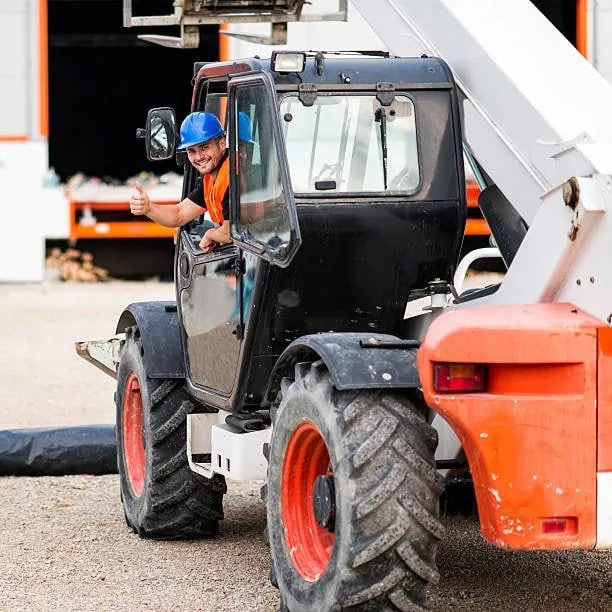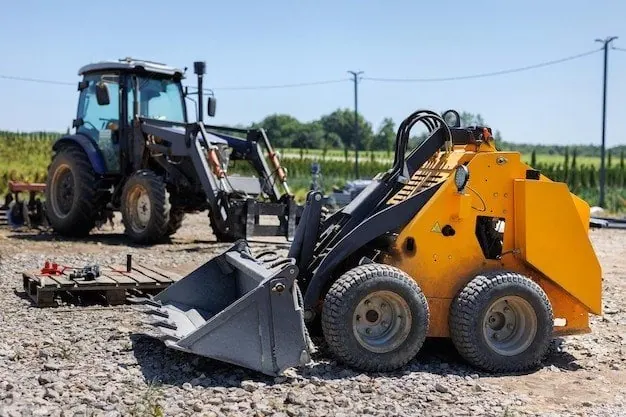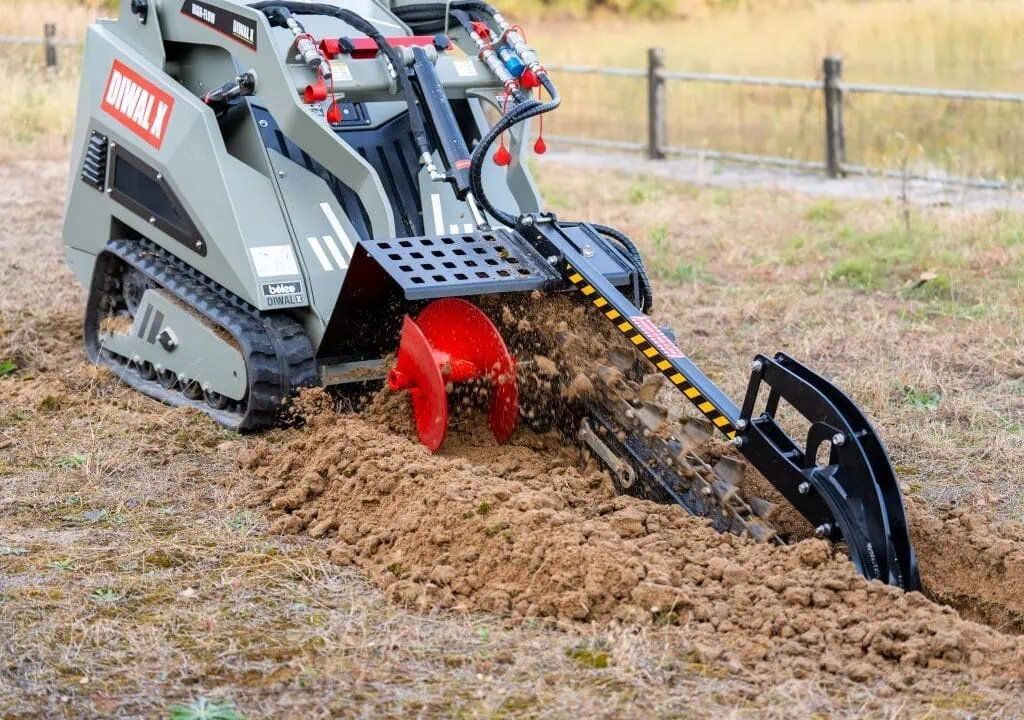Tabla de contenido
PalancaIntroduction:
In construction and excavation, safety and efficiency are paramount. One factor that plays a crucial role in both is the weight of the equipment used, especially the skid steer loader. When used in benching techniques, which involve excavating the sides of a trench or excavation to create horizontal steps, the weight of the skid steer loader can significantly affect both performance and safety. Understanding the impact of skid steer loader weight on benching operations is vital for creating safe, efficient, and productive work environments. This article explores how skid steer loader weight influences benching safety, operational efficiency, and how to find the right balance for optimal performance.
The Role of Skid Steer Loader Weight in Benching:
The weight of a skid steer loader directly affects its stability, traction, and ability to perform in challenging benching conditions. Heavier skid steer loaders can generate more digging power and handle larger loads, but they can also exert more pressure on the ground. This increased weight can destabilize the excavation site, especially in soft or uneven terrain. Therefore, understanding how skid steer loader weight impacts both power and stability is crucial for ensuring that the excavation site remains intact and safe during the project.

Safety Considerations:
In any excavation project, safety comes first. Matching the weight of the skid steer loader to the specific site conditions and benching technique is essential to prevent accidents. A skid steer loader that’s too heavy can increase the risk of tip-overs or cause ground collapse, while one that’s too light may fail to complete the required tasks efficiently. To optimize safety, contractors must carefully assess the weight capacity of the skid steer loader and choose a model that balances power and stability for the task at hand. This balance ensures that the machine remains safe to operate while effectively performing the benching work.

Efficiency in Benching Operations:
Efficiency in benching is not just about speed but also about doing the work effectively and with minimal waste. The weight of the skid steer loader plays a crucial role in achieving this. Lighter skid steer loaders are more agile, making them ideal for maneuvering in tight spaces and uneven terrains, helping to speed up setup and repositioning. However, they may lack the power needed to handle tougher tasks. In contrast, heavier skid steer loaders can tackle larger loads and dig deeper, but their increased weight may make them less efficient in certain applications. Finding the right weight for the job at hand is essential for ensuring that operations are both fast and efficient.
Balancing Skid Steer Loader Weight for Optimal Performance:
To achieve optimal performance in benching, it’s crucial to strike the right balance between skid steer loader weight and its operational capabilities. A heavier loader may be more stable, but it could slow down maneuvering in tight or unstable conditions. A lighter loader might be more maneuverable but could struggle with tasks requiring more force. Contractors must carefully consider the specifics of the soil, the depth of the excavation, and the bench configuration to select a skid steer loader with the appropriate weight. Striking this balance ensures that the loader performs at its best without compromising safety or efficiency.

The Science Behind Skid Steer Loader Weight:
The weight distribution of a skid steer loader directly impacts its performance. A machine with a well-balanced weight distribution will have a lower center of gravity, offering better stability and minimizing the risk of tipping over, especially on uneven ground or when lifting heavy loads. Engineers design skid steer loaders to ensure their weight is distributed for optimal balance, enabling better maneuverability and reducing potential accidents. A thorough understanding of how skid steer loader weight affects both stability and performance is crucial for safe operation.

Types of Benching Techniques:
Benching techniques are divided into two categories: simple and multiple benching. Simple benching involves creating a single level or step, while multiple benching involves several levels or steps. The weight of the skid steer loader plays a key role in determining which technique is most suitable for the excavation. In simple benching, the loader’s weight may be less of a concern since the task mainly involves digging and moving soil. However, in multiple benching, the loader’s weight becomes more important due to the additional stress and stability required to maintain safety across multiple levels.
Simple Benching:
In simple benching, the skid steer loader is used to create one level or step. This is generally applied for shallow excavations or stable soil conditions. While the weight of the skid steer loader in this situation is less critical, the loader still needs sufficient weight to provide stability and traction when moving soil and digging. A balance between weight and maneuverability ensures that the loader can operate efficiently without compromising safety or effectiveness.
Multiple Benching:
Multiple benching, which involves creating a series of steps or levels, places more demands on the skid steer loader. The weight of the skid steer loader becomes more crucial here, as it needs to support the sides of the excavation and maintain stability as it works on uneven ground. Heavier loaders can provide more power and stability in this setting but may face maneuverability challenges, especially in tighter spaces. In contrast, lighter loaders can navigate easily but may not be able to lift and move heavy loads efficiently. Understanding the weight requirements for multiple benching operations is essential to maintaining both safety and productivity.

Soil Conditions and Skid Steer Loader Weight:
Soil conditions play a major role in determining the weight of the skid steer loader best suited for the job. Soft or loose soils may not support the weight of a heavy loader, potentially leading to ground collapse. On the other hand, heavier loaders are ideal for harder, more compact soils where additional weight is required for digging and moving materials. Contractors must assess the soil type to ensure that the skid steer loader weight is appropriate for the conditions, ensuring both safety and efficiency during operations.
Depth and Width of Excavation:
The depth and width of an excavation directly impact the skid steer loader weight needed. Deeper and wider excavations require more stability and power, which typically calls for a heavier loader. However, heavier machines may be harder to maneuver in tighter spaces, which can be a challenge when access to the excavation site is limited. Choosing the right skid steer loader weight for the specific dimensions of the excavation ensures that the loader can handle the required workload without sacrificing maneuverability.
Desired Bench Configuration and Skid Steer Loader Weight:
The layout of the bench levels, or the bench configuration, also determines the ideal skid steer loader weight. For configurations with multiple levels that are close together, a lighter machine may be more advantageous as it can maneuver quickly between levels. On the other hand, a large, single level requires more stability, and a heavier skid steer loader may be necessary to move and compact the soil effectively.

Skid Steer Loader Weight and Operator Safety:
The weight of the skid steer loader has a direct impact on operator safety. A heavier loader offers more stability and can protect the operator in the event of a tip-over, but it can also be more difficult to control on uneven surfaces. A lighter loader may be easier to control but offers less protection in case of an accident. Proper training for operators, tailored to the specific weight and capabilities of the skid steer loader they are using, is essential to ensure a safe working environment.
Skid Steer Loader Weight and Environmental Impact:
Heavier skid steer loaders can cause more disruption to the environment, including soil compaction, erosion, and damage to vegetation. Lighter loaders may be less damaging to the landscape, but they may not have the power needed for heavy-duty tasks. It’s important to consider the environmental impact of the skid steer loader’s weight when choosing equipment for an excavation project. By selecting the right loader, contractors can minimize environmental damage while maximizing operational efficiency.
Skid Steer Loader Weight and Fuel Efficiency:
Skid steer loader weight can also affect fuel consumption. Heavier loaders tend to consume more fuel due to the increased load they carry, which can increase project costs. Lighter loaders are generally more fuel-efficient, but they may lack the power required for certain tasks, leading to longer work times and potentially higher overall fuel consumption. Finding the balance between power and fuel efficiency is essential for managing project costs effectively.
Skid Steer Loader Weight and Maintenance Costs:
The weight of a skid steer loader also impacts its long-term maintenance costs. Heavier machines tend to experience more stress on their components, requiring more frequent maintenance and potentially higher repair costs. Lighter loaders may require less frequent maintenance but may have a shorter lifespan due to more wear and tear. Contractors must evaluate both the weight and long-term maintenance requirements of a skid steer loader before making a selection.

Conclusion:
The weight of a skid steer loader is a critical factor in benching techniques, affecting both safety and efficiency. By carefully considering the loader’s weight and matching it to the specific requirements of the excavation, contractors can ensure safer and more productive operations. Whether working in simple or multiple benching scenarios, the key is balancing weight with the required power, maneuverability, and stability. Selecting the right skid steer loader weight is essential for successful benching operations and overall project success.
Call to Action:
Need help selecting the perfect skid steer loader for your excavation project? Contact our team at HIXEN today to receive expert advice on the best skid steer loader weight for your specific needs. Let’s ensure that your benching operations are safe, efficient, and cost-effective.Contact us for more information.
